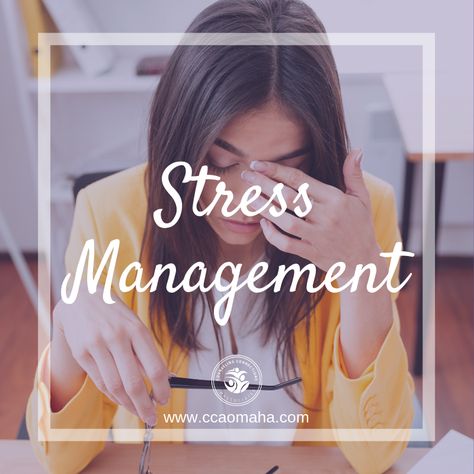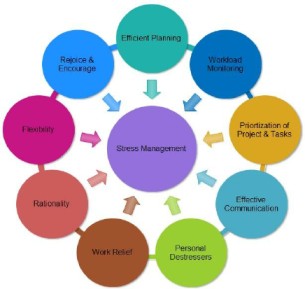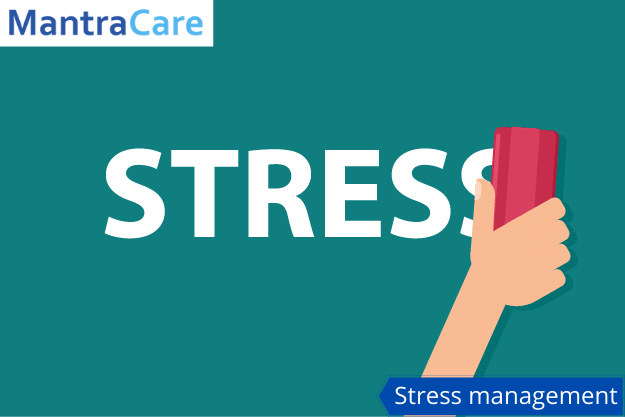Contents
What Is Stress?
Stress is a normal mind function that occurs in tough-to-handle situations. It is a psychological response given by a person when placed in certain situations. These reactions vary from one person to another, what may seem stressful to one may be normal for another. The small amount of stress in daily life situations often helps us to perform better in life. But too much stress can also hinder your ability to cope up with stress and can cause low performance. Therefore, stress management is necessary.
The brain has a function to release hormones when present in tough and stressful situations, when these situations are overcome the brain relaxes and returns to its normal state. Continuous exposure to a stressful environment can cause complications in the body as the brain does not get time to relax properly. This is serious conditions can affect the well-being of the person and cause various ailments and diseases.

Stress Management
Stress management techniques help in controlling the stress level and improve the decision-making of the person making them more relaxed and at ease. Managing stress can be a challenging task and needs patience to achieve a certain goal. In order to manage stress, one must identify their triggers. Some causes of stress can be identified easily but some positive events which are going to occur in your life can also cause stress. After proper identification of stress think about the strategies that you can use to keep stress at bay. If you can’t figure out things by yourself then seek medical help and go for therapy.
Sometimes a change in lifestyle and behavior towards others causes a significant reduction in stress. Practicing yoga and maintaining a proper sleep cycle can also help you to manage your stress. Stress does not disappear from life as you may encounter various situations and hardships in life that will cause you stress but learning stress management can efficiently increase your ability to cope up with the challenges given by life.
Causes of Stress
Most people think that stress only occurs in hardships and challenges in life but you need to understand that any situation can be triggering for a person. What may be a stressful situation for one may not be the same for the other person. Feeling of being under stress is normally triggered by being under a lot of pressure, big changes in life (positive or negative), having big responsibilities which you’re not ready for, academic and work-related stress, and being in uncertainty. Stress can be due to one big thing or maybe a build-up of many small things which might make it harder for you to identify your triggers.
Self-consciousness
In some situations, our perception, experience, emotional resilience, and support we receive from family determine the amount of stress we are under. Your thought processes, self-esteem, and how you deal with a particular situation may cause you different amounts of stress in different situations. Due to your dependence on such factors, it is always said that you cannot determine the amount of stress one is dealing with as you can take their situation lightly. For example, you may find it comfortable to speak in front of a group of people but someone in your group may find the situation stressful and remain anxious.
Change In Life Events
Stress can also be caused due to various life events which occur naturally and you cannot avoid them like unexpected pregnancy, long term health problems, organizing events, getting married or divorced, difficult relationships, losing a job, exams, pending assignments, poor living conditions or financial instability, moving into a new house and debt. Some situations may be happy situations for you like getting a new job or house but they may cause you to stress as their incoming in your life will bring big changes.

Changes In Mood
When you are under stress you may feel irritated, aggressive, impatient, burdened, depressed, uninterested, lonely, or may not be able to enjoy yourself fully. In extremely stressful situations you may get suicidal thoughts and feelings. You might find yourself constantly worrying, not being able to make decisions, avoiding situations, eating too much or skipping meals, unable to concentrate, or would find yourself being overly emotional.
Symptoms of Stress
Stress can also affect you physically and can cause panic attacks, nightmares, tiredness, headaches, body aches, chest pain, clenching your jaw, high blood pressure, indigestion, shallow breathing, constipation, or feeling sick and dizzy.

Stress Management Techniques
There are various ways through which you can cope up with stress. You need to identify your triggers of stress, organize your time and accept the things which can’t change. These can help you with dealing with your pressure efficiently. Some techniques which you can use to manage your stress after you have identified your triggers are mentioned below.

Exercises
It can help you to combat your mental stress as you would be putting physical stress on your body. Study shows that people who exercise regularly or do physical activity tend to remain less anxious when compared to people who do not exercise at all. Doing physical work releases hormones like endorphins and reduces the effect of stress hormone (cortisol). Exercising makes the body tired physically and improves your sleep pattern. It also promotes body positivity.
Supplement Intake
Some of the supplements that help in the reduction of stress and anxiety include lemon balm, omega 3 fatty acids, ashwagandha, green tea, valerian, and kava kava. Studies have shown that their use has caused a decrease in the amount of stress and anxiety.
Scented Candles
Use of scented candles and essential oils to calm your body and mind. They also reduce your stress and anxiety. Aromatherapy is a type of therapy in which various scents are used to reduce stress and improve sleeping patterns.
Reduction In Caffeine
There is a high amount of caffeine present in various food items like coffee, tea, chocolate, and energy drinks. High doses of caffeine intake can increase your anxiety and stress and you should cut off caffeine from your diet.
Journaling
It is important to let out your stress, feelings, and thoughts, and what’s better than journaling. In journaling, you maintain a diary in which you can note down your feelings and thoughts. It is also helpful in planning out your week in advance in order to have less stress.

Quality Time
You should spend time with your friends and family members. Your dear ones can help you in providing support and spending quality time with them would make the brain release oxytocin hormone which reduces the amount of stress.
Laugh
Watch some light-hearted shows or stand-up comedies to relieve tension in your muscles and reduce the stress present.
Learn To Say No
If you find yourself in an uncomfortable situation or know that you can’t handle the amount of pressure put by others then say no to the job. Be selective of what you want to do and what you don’t want to do. Set your own priorities and work according to that.
Yoga
Doing yoga increases flexibility reduces stress and relaxes the tensed muscles in our body. Yoga can be done by any age group of people. It increases inner awareness and considerably lowers stress. Doing mindful yoga helps in increasing self-esteem and reduces the symptoms of stress and anxiety.
Cuddle
Having physical contact with your pet, parents or spouses helps in releasing oxytocin and lowers the level of cortisol.
Music
Listening to soothing and relaxing songs helps in improving your mood. Such songs lower blood pressure as well as heart rate causing relaxing of the tensed muscles.
Deep Breathing
The goal of this exercise is to make you focus on your breath and make it slower and deeper. Deep breathing can be done either by diaphragmatic breathing, abdominal breathing, belly breathing, or paced respiration. Deep breathing induces calming effects and helps in slowing the heart rate.

The bottom line of these exercises is that you should engage yourself in exercises that will help you to calm down and organize your thoughts. If you do not feel good then it is advised to visit a therapist and receive a proper consultation regarding your issues.
Help From Friends And Family
If you know someone who is suffering from stress and anxiety and are probably confused about how to provide support and comfort then some points are mentioned below for your use.
- Help them out in recognizing the signs of stress. In some cases, the person suffering from stress and anxiety isn’t able to see their signs and consider them as normal worrying.
- Help them by pointing it out in a polite manner and ask them how you can provide them comfort. Help them by identifying their triggers.
- Do not be judgemental and observe them closely.
- Listen to them carefully when they are sharing their feelings and thoughts.
- Let them do all the talking, don’t interfere with your suggestions instead just listen to them and give them a hug if needed. Just listening can do wonders and can help your friend to deal with stress.
- Ask them how you can help them and reassure them when they calm down.
- Suggest them to practice some stress management techniques and take out time from your schedule to spend quality time with them.
- Also, join them in physical exercises they want to try.
- Be supportive but also take care of your mental health. Taking care of a stressed person may put you in stressful situations so take time to check your well-being as well.
A Word From Mantra Care
Your mental health — your psychological, emotional, and social well-being — has an impact on every aspect of your life. Positive mental health essentially allows you to effectively deal with life’s everyday challenges.
For more information, please contact MantraCare. Stress can have both physical and mental effects on the body, leading to negative consequences such as anxiety, depression, and even physical illnesses. If you have any queries regarding Online Stress Counseling experienced therapists at MantraCare can help: Book a trial Stress therapy session


